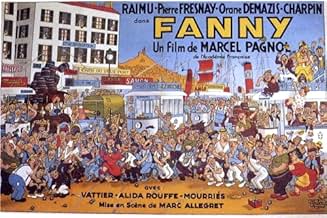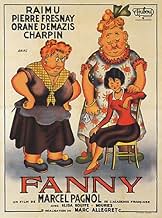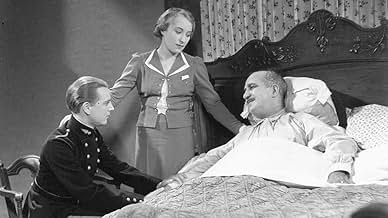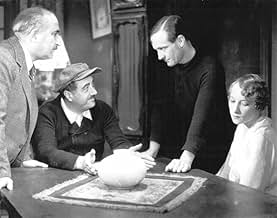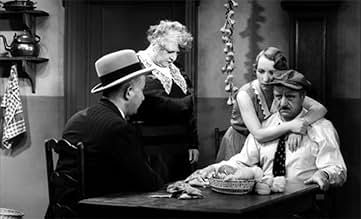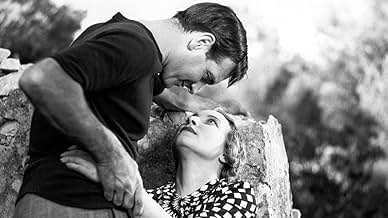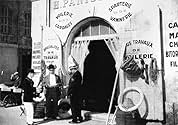Cuando el novio de Fanny la deja y se marcha, descubre que está embarazada.Cuando el novio de Fanny la deja y se marcha, descubre que está embarazada.Cuando el novio de Fanny la deja y se marcha, descubre que está embarazada.
Fernand Charpin
- Honore Panisse
- (as Charpin)
Auguste Mouriès
- Félix Escartefigue
- (as Mouriès)
Robert Vattier
- Albert Brun
- (as Vattier)
Édouard Delmont
- Dr. Felicien Venelle
- (sin créditos)
Pierre Prévert
- Un voyageur du tramway
- (sin créditos)
Annie Toinon
- Amélie
- (sin créditos)
Opiniones destacadas
If you can get by the first fifteen minutes, get into the leisurely pacing and that fact that nothing is going to explode and no one shoots anybody or stabs anyone in the eye, and the film is about learning to live with other human beings, about being a parent, about falling and staying in love, perhaps you'll come to love this film, too.
The trilogy is set in another time long gone--Marseilles, a provincial fishing village, where Cesar and his son operate a sort of bar where locals drift in and out and play cards; a pretty young woman sells seafood outside, and she's known son Marius since they were children. Enough said: except that the acting is amazingly naturalistic for a 1930's film, that the performance by famed French entertainer Raimu is beyond words, is simply astounding in his range of emotions, his understanding of the human condition. This understated drama is a quiet masterpiece.
The trilogy is set in another time long gone--Marseilles, a provincial fishing village, where Cesar and his son operate a sort of bar where locals drift in and out and play cards; a pretty young woman sells seafood outside, and she's known son Marius since they were children. Enough said: except that the acting is amazingly naturalistic for a 1930's film, that the performance by famed French entertainer Raimu is beyond words, is simply astounding in his range of emotions, his understanding of the human condition. This understated drama is a quiet masterpiece.
Part two of Marcel Pagnol's wonderfully simple, but, mind me, not simple-minded Marseilles trilogy is even funnier and more touching than its predecessor, thanks to expanded supporting roles and a broader variety of outdoor locations.
The dialogue is as humorously and emotionally rich as ever and the cast, almost outshone by Raimu's terrific performance, works wonders with their lines.
The pace may drag slightly from time to time and some story aspects feel redundant, but the basic concerns of Pagnol's deeply philanthropic approach to issues like paternal love, social constraints and diverging attitudes towards life offer more than enough pleasures.
8 out of 10 suspicious premature births
The dialogue is as humorously and emotionally rich as ever and the cast, almost outshone by Raimu's terrific performance, works wonders with their lines.
The pace may drag slightly from time to time and some story aspects feel redundant, but the basic concerns of Pagnol's deeply philanthropic approach to issues like paternal love, social constraints and diverging attitudes towards life offer more than enough pleasures.
8 out of 10 suspicious premature births
Part the Second of this trilogy reminds us that at heart it is pure melodrama and if not quite 'dead! and never called me mother', it is certainly from the same stable. Arguably Orane Demazis - replicating here, as indeed are all the principals, her stage role as the eponymous seduced and abandoned and slightly enceinte ingenue - is the weakest link in an unusually strong chain yet even then with the handicap of being saddled with a role that today would be risible (I doubt if it is possible to 'SPOIL' a classic which is now some 72 years old so suffice it to say that as a result of 'giving herself' to Marius, shortly before he ships out on an extended cruise, Fanny finds herself in an 'interesting' position and must make some tough choices. Today, of course, it is practically an honor to fall pregnant with no father material in sight and a State standing by to cosset the resulting infant from cradle to grave but in 1932 the resulting 'shame' embraced not only the mother-to-be but also her family) she manages to elicit our compassion and keep our humor at bay. Pedants will have a field day with the dodgy arithmetic - Marius has supposedly signed up for a five-year voyage yet on his return Fanny's son is a mere 10 months old - but what matters is the acting-plus-believability factor and here, thanks as always to the great Raimu, aided and abetted by Fernand Charpin, Alida Rouffe and Milly Mathis they bring it off to a fare-thee-well. Pierre Fresnay as Marius does little more than play the fly-in-the-ointment in the closing quarter of the movie and may well have been looking ahead one full decade to 'Le Corbeau'. Building on the first part and moving seamlessly to the next stage this is a worthy successor to 'Marius'. 9/10
The sequel to "Marius" the year before stays in the same vein and is the same kind of staged theatre all the way, with the same kind of virtuoso performances by all the actors, but there is another director, and you miss the Alexander Korda flamboyance and liberal sweeps and flow of the movie tempo. This film is more like chamber theatre all the way, and you don't even see much of the harbour, the glorious ships, the street life and the joints. Fanny, left alone and pregnant by Marius going to sea for five years, marries another older suitor, just to give her child a future and safe environment, and it works out well, until Marius comes back after only two years as a most unsuspected surprise and does his best to complicate things but immediately leaves again. The story isn't much, it is very inferior to the first part, but there is a third part four years later, which will show the end of the story, directed by Marcel Pagnol, the author, himself - he made many films besides being a prolific Provence writer.
Criterion / Janus Films
Marius (1931) + Fanny (1932) + César (1936)
Directed by Marc Allégret, "Fanny" holds a significant place in the golden age of French cinema as the second film in Marcel Pagnol's renowned Marseille Trilogy. I'm only discovering this now because these films have never been shown in my country (Turkey) on any platform, past or present.
Within the context of the trilogy, "Fanny" continues the story that began with "Marius" (1931) and forms a crucial part of the epic love and family saga that will conclude with "César" (1936), which is my next stop and yet to be watched, based on my research.
From the perspective of cinema in its time, "Fanny" is considered a remarkable example of the power of dialogue and performance, even though the era of sound film was still in its early stages. Pagnol's theatrical writing style has been successfully adapted to the screen, masterfully reflecting the depth of the characters and the emotional intensity of the story.
The film, dealing with universal themes such as love, sacrifice, family ties, and societal expectations, manages to appeal to modern audiences as well. From the perspective of today's cinema, "Fanny" stands out with its themes that still resonate with contemporary viewers. Its importance within the Marseille Trilogy is undeniable. According to my research, many authorities consider "Fanny" to be the heart of the trilogy.
The impressive performances of Orane Demazis and Pierre Fresnay create unforgettable moments in the film. In particular, Orane Demazis's portrayal of Fanny perfectly reflects the character's inner conflicts and emotional journey. "Fanny" stands out not only as a period film but also for its exploration of the complexities of human nature and the impact of societal norms on individuals' lives. The film addresses moral dilemmas and characters' difficult decisions with understanding, without judgment, and manages to do so without ever boring the audience.
Next stop: César (1936)
Marius (1931) + Fanny (1932) + César (1936)
Directed by Marc Allégret, "Fanny" holds a significant place in the golden age of French cinema as the second film in Marcel Pagnol's renowned Marseille Trilogy. I'm only discovering this now because these films have never been shown in my country (Turkey) on any platform, past or present.
Within the context of the trilogy, "Fanny" continues the story that began with "Marius" (1931) and forms a crucial part of the epic love and family saga that will conclude with "César" (1936), which is my next stop and yet to be watched, based on my research.
From the perspective of cinema in its time, "Fanny" is considered a remarkable example of the power of dialogue and performance, even though the era of sound film was still in its early stages. Pagnol's theatrical writing style has been successfully adapted to the screen, masterfully reflecting the depth of the characters and the emotional intensity of the story.
The film, dealing with universal themes such as love, sacrifice, family ties, and societal expectations, manages to appeal to modern audiences as well. From the perspective of today's cinema, "Fanny" stands out with its themes that still resonate with contemporary viewers. Its importance within the Marseille Trilogy is undeniable. According to my research, many authorities consider "Fanny" to be the heart of the trilogy.
The impressive performances of Orane Demazis and Pierre Fresnay create unforgettable moments in the film. In particular, Orane Demazis's portrayal of Fanny perfectly reflects the character's inner conflicts and emotional journey. "Fanny" stands out not only as a period film but also for its exploration of the complexities of human nature and the impact of societal norms on individuals' lives. The film addresses moral dilemmas and characters' difficult decisions with understanding, without judgment, and manages to do so without ever boring the audience.
Next stop: César (1936)
¿Sabías que…?
- TriviaFamed restaurateur and founder of California cuisine, Alice Waters, was so taken with the Fanny trilogy that she named her Berkeley restaurant Chez Panisse. The café upstairs from the restaurant is decorated with posters from the films Marius, Fanny, and César. Waters also named her own daughter Fanny and opened a small breakfast café in Berkeley called "Café Fanny" in 1984 which closed in March 2012.
- ConexionesEdited into Histoire(s) du cinéma: Une histoire seule (1989)
Selecciones populares
Inicia sesión para calificar y agrega a la lista de videos para obtener recomendaciones personalizadas
- How long is Fanny?Con tecnología de Alexa
Detalles
Taquilla
- Total en EE. UU. y Canadá
- USD 8,262
- Fin de semana de estreno en EE. UU. y Canadá
- USD 7,720
- 8 ene 2017
- Total a nivel mundial
- USD 8,262
- Tiempo de ejecución2 horas 20 minutos
- Color
- Relación de aspecto
- 1.20 : 1
Contribuir a esta página
Sugiere una edición o agrega el contenido que falta

Principales brechas de datos
By what name was Fanny (1932) officially released in India in English?
Responda
